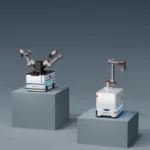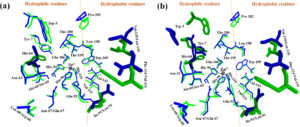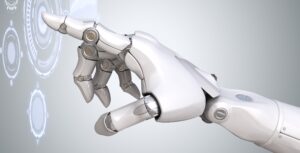
Robot's arm working with Virtual Reality touchscreen. 3D illustration
Title: Automation and Its Impact on Eliminating Unemployment
The rapid advancements in automation technologies have transformed industries across the globe. While automation often sparks fears of job loss, it is essential to recognize its role in enhancing productivity and, paradoxically, reducing unemployment. This article delves into the ways automation is impacting the labor market, providing insights into the relationship between automation and unemployment.
- Job Transformation, Not Elimination
One of the common misconceptions about automation is that it leads to the outright elimination of jobs. In reality, automation often transforms jobs, making them more efficient and productive. For instance, in manufacturing, repetitive and dangerous tasks are being automated, allowing human workers to take on more creative and supervisory roles. This shift enhances the overall work experience and can result in higher job satisfaction.
- Economic Growth and Job Creation
Automation not only improves productivity but also stimulates economic growth. When businesses become more efficient, they can expand and invest in new ventures. This expansion creates opportunities for job growth in various sectors, offsetting the jobs displaced by automation. For instance, the automotive industry’s shift toward electric vehicles and automation has led to increased employment in research and development, software engineering, and advanced manufacturing.
- Skill Enhancement and Education
As automation takes over routine tasks, the demand for a skilled workforce capable of managing and maintaining automated systems increases. This presents an opportunity for educational institutions to adapt their curricula and provide training in fields like robotics, artificial intelligence, and data analysis. By preparing individuals for these new roles, automation can lead to the creation of more high-quality jobs that require advanced skills.
- Greater Global Competitiveness
Automation helps businesses become more competitive on a global scale. When companies can produce goods and services more efficiently, they are better equipped to compete in international markets. This competitiveness can lead to increased exports and expansion, further driving job creation in export-oriented industries.
- Industry-Specific Case Studies
Various industries have already witnessed the positive impact of automation on employment. For example:
- Agriculture: Automated machinery and precision farming techniques have increased productivity, resulting in job growth in areas such as data analysis, agricultural technology development, and sustainable farming practices.
- Healthcare: Automation in healthcare, including robotic surgery and diagnostic tools, has improved patient care and created demand for healthcare professionals, including medical technologists and healthcare data analysts.
- Logistics and E-commerce: Automation in warehouses and logistics centers has not only sped up order fulfillment but also created jobs in logistics planning, maintenance, and software development.
Conclusion
Automation is a powerful tool that can revolutionize industries and improve productivity. Rather than eliminating jobs, it often transforms them and creates new opportunities for employment. As the global economy continues to evolve, it is essential for governments, businesses, and educational institutions to adapt and invest in skill development and technology to harness the benefits of automation fully. The future of work will undoubtedly be different, but with strategic planning and investment, automation can be a force for positive change, reducing unemployment and leading to a more prosperous society.










